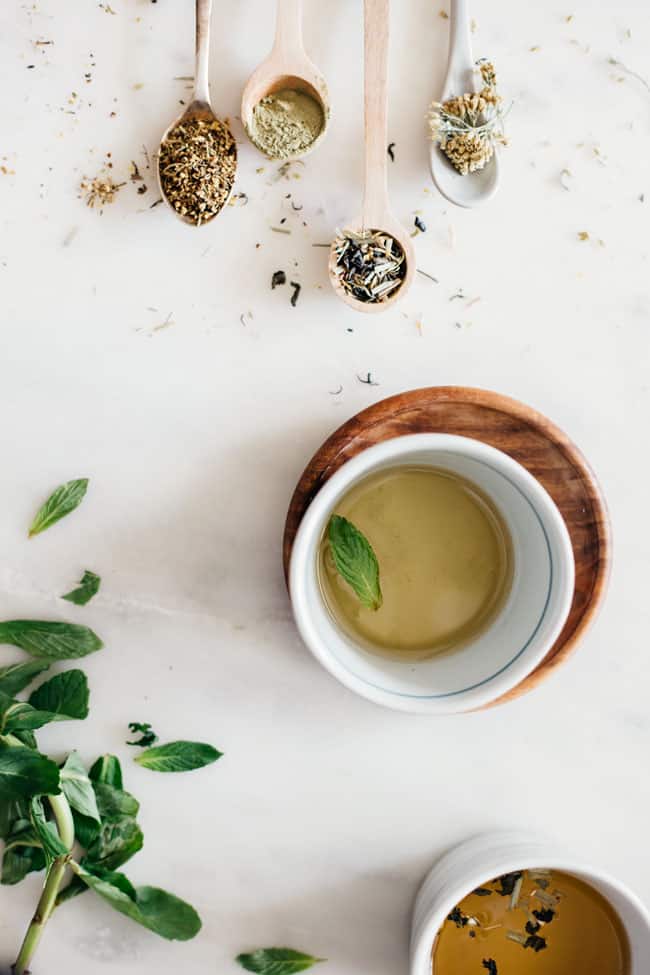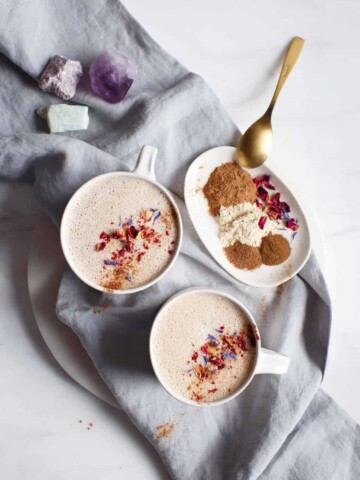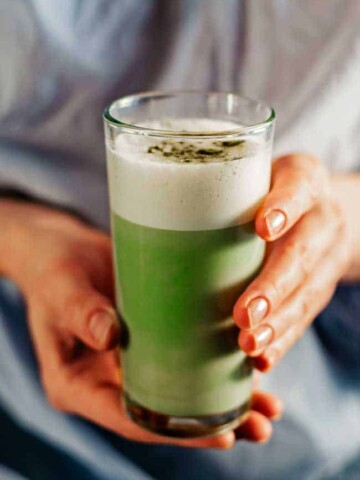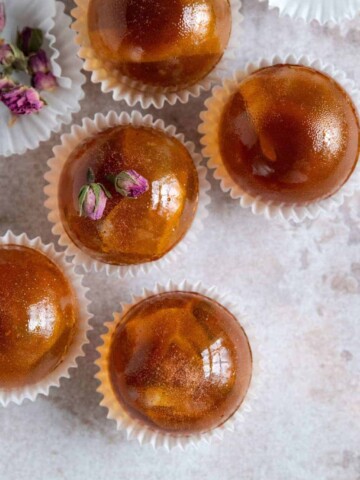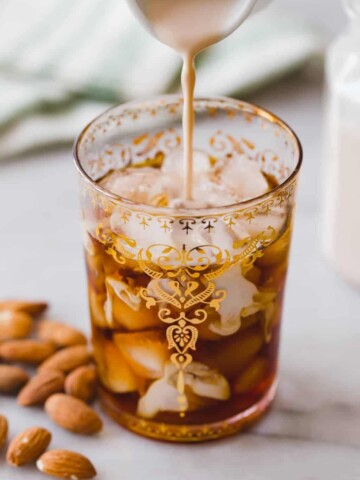Teas offer us so many health benefits—inside and out. Some teas can reduce bad cholesterol and lower the risk of heart disease, while others have antibacterial properties and can combat sleep issues. But did you know that teas are also great for our skin?
To see the benefits, you can drink it, apply it directly to your skin, or use extracts. There are so many to choose from, and each works in its unique way to keep your skin looking beautiful.
Meet the Experts
BreAnna Guan, N.D., a Boston-based naturopathic doctor
Lana Butner, N.D., a naturopathic doctor practicing in New York City
Alex Keller, N.D., a practicing naturopathic doctor and medical director at Fullscript
Medically reviewed by Dr. Jennifer Haley, a board-certified dermatologist
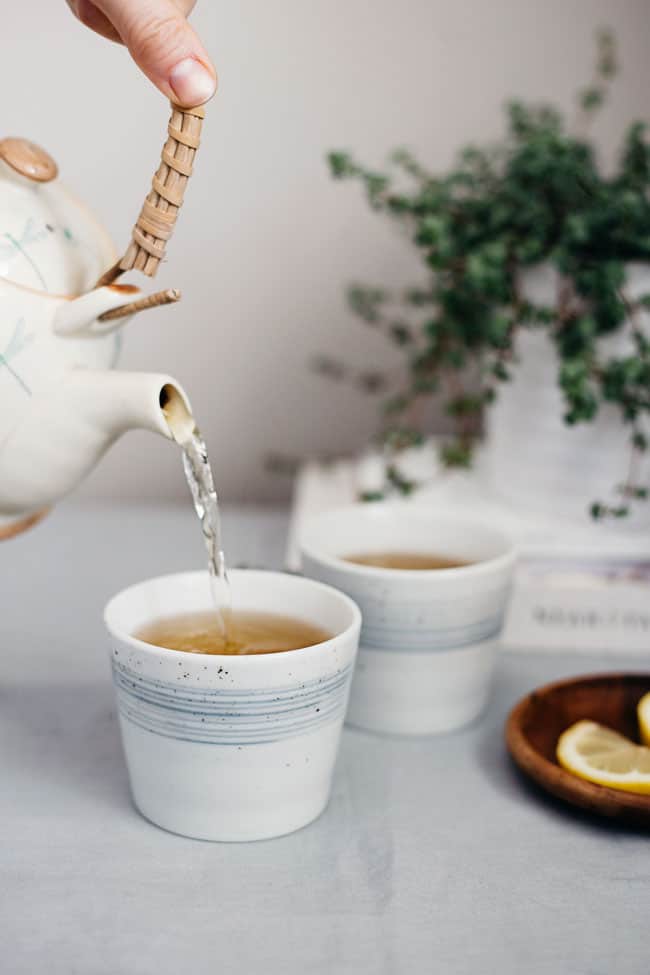
The Best Teas for Your Skin
It all starts from within. When your insides are working correctly, it shows on the outside. And most importantly, tea starts with water—the most essential part of keeping skin healthy. People have been drinking tea for thousands of years, and it’s clear why.
1. Chamomile tea
Sleep is imperative for maintaining a glowing complexion, which may make chamomile the most popular tea for skin. When you aren’t sleeping well, your mirror will show you the effects. Next time you see dark circles creeping up, put some chamomile tea bags on your eyes to reduce the puffiness and get rid of that tired look.
Its calming properties also make this tea excellent for red, irritated skin. And not only does chamomile promote relaxation and sleep, but it contains quercetin, which protects your skin from sun damage with its potent antioxidant properties [source].
2. Jasmine tea
Not only does it smell beautiful, but jasmine tea actually has antioxidant and antibacterial properties that keep your immune system healthy [source]. It relaxes and dilates the blood vessels to bring a rich blood supply with all of its nutrients to the skin [source].
Jasmine can prevent the signs of aging, the leaves help in wound healing [source], and it has even been shown to treat skin conditions like acne [source].
3. Green tea
One of the most commonly consumed beverages around the world, green tea is packed full of sun damage-fighting agents. Too much sun exposure can increase your risk for skin cancer and age your skin prematurely.
"Rich in protective polyphenols, green tea is an important plant for protecting the skin against aging and inflammation caused by UV sun damage," says BreAnna Guan, N.D., a Boston-based naturopathic doctor.
Green tea retains more of its natural polyphenols because it is not fermented. This preserves about 60% to 80% of the most widely studied polyphenols, called catechins [source]. In particular, EGCG is the most plentiful and well-researched of the four catechins for its beneficial effects on the skin. It works as a powerful anti-inflammatory and reduces the damage caused by oxidative stress from the sun’s rays and other harmful exposures [source].
Research, including one study published in the Journal of Nutritional Biochemistry, has shown that green tea has the ability to prevent UV-induced skin cancer in mice [source]. "There are many powerful epidemiological studies showing green tea’s protective health benefits. So I highly recommend daily consumption of green tea for most of my clients who can tolerate it to support their overall wellness and longevity," adds Dr. Guan.
Try this Green Tea Energy Drink for a great skin boost.
4. Rooibos
Also known as Red Bush tea, rooibos has been used for thousands of years in South Africa and can be used to treat a variety of skin conditions. It’s thought that the flavonoids in rooibos fight unwanted pathogens and keep eczema and acne flare-ups at bay, notes Lana Butner, N.D., a naturopathic doctor practicing in New York City.
It is also anti-inflammatory and overflowing with antioxidants. So, not only does it help with complexion brightening and evening, but it also has been tested in various studies to improve hair loss!" she adds.
Try it in this Rooibos Sun Tea.
5. Black tea
Because it’s packed with antioxidants, black tea also fights free radicals in the body (seeing a little theme here with tea?) and slows the signs of aging. It has anti-inflammatory properties and encourages a healthy immune system due to the high caffeine levels [source], which can prevent colds and viruses that negatively affect our skin.
Next time you’re thinking about enjoying a cup of tea, try applying a cool black tea rinse directly to the face.
6. Dandelion tea
Dandelions aren’t just weeds that take over your garden. They're delicious in salads, make great tea, and have amazing benefits for your skin and internal organs.
Dandelion root tea is full of antioxidants and immune-enhancing properties that help to keep your skin looking young and fresh. Best known as a great detoxifier and supporter of liver function, it can aid digestion, which also affects the appearance of skin [source].
7. Ginger tea
Ginger tea has tremendous anti-inflammatory power to aid your digestion and your skin [source]. It’s been shown that when the digestive tract is off, the skin can also suffer, and annoying dermatologic conditions can arise.
Spice up your tea game with homemade ginger tea.
8. Peppermint tea
This herb helps with more than just an upset stomach. Peppermint tea contains menthol, which makes this tea a great choice for oily skin by slowing oil production and encouraging cell turnover. This gets rid of dead skin cells and keeps your skin constantly glowing.
Peppermint has been shown to be useful in the treatment of itchy skin conditions, such as eczema and dermatitis [source]. It is also a powerful antioxidant and inhibits bacteria [source], which can help control aging and acne.
9. White tea
White tea has even more antioxidants than green tea and has the highest catechin content! "Some research suggests that white tea may inhibit the breakdown of elastin and collagen, two components of the skin that promote elasticity and overall appearance," says Alex Keller, N.D., a practicing naturopathic doctor and medical director at Fullscript. This is because it’s the least processed type of tea. It has potent antibacterial properties that can fight several types of skin conditions.
Our skin contains enzymes called matrix metalloproteinases (MMP) that break down the collagen in our skin and increase with age [source]. White tea prevents the increased MMP from reducing the levels of collagen and elastin—both necessary for healthy skin [source].
10. Oolong tea
With benefits from both black and green teas, oolong tea really has a taste unlike other teas. It can improve the color of your skin, reduce dark spots, and might even help fight sun and smoking damage [source], making this tea definitely worth trying!
11. Kombucha
Kombucha, made from fermented black and green tea, is great for detoxifying the skin. It contains all of the antioxidants that those teas do. So it's great for reducing fine lines and improving skin elasticity to give you a vivacious complexion.
It can even be used as a topical astringent and treatment for sunburns. The natural probiotics found in kombucha also have numerous health benefits [source].
Save money and make kombucha at home.
12. Matcha
Originating from Japan, this bright green tea is rich in nutrients and known for detoxifying the skin. It contains antioxidants, chlorophyll, and catechins to help fight bacterial infections and prevent free radical damage.
"Some of the main constituents are epigallocatechin gallate (EGCG), which is antiviral and chock full of antioxidants," explains Dr. Butner. "The antioxidant and anti-inflammatory properties in green tea catechins can also help with cellular oxidative damage."
The catechins in matcha are more numerous than those contained in regular green tea [source]. Matcha powder is becoming very common to use in face masks, creams, and lotions, but you can still drink a cup or two to reap the full-body benefits!
Try it in this easy matcha latte. Look for “ceremonial-grade” matcha for the highest health benefits.
Tea for Skin FAQs
Does drinking tea also help your skin?
Almost all tea comes from the plant Camellia sinensis. This plant is known to contain many properties that benefit the whole body, including the skin. It contains polyphenols, potent antioxidant and anti-inflammatory compounds that protect the skin primarily from UV and other environmental damage. Studies on green tea have shown that its polyphenols are protective whether applied on the skin or taken internally [source]. Thus, it makes sense that the other health-promoting actions [source] would likely also help skin when the tea is consumed.
Which tea helps most with acne?
Comparison studies have not been done that examine the effects of different teas on acne. When it comes to researching the use of tea for acne, green tea is a clear winner. A 2017 review article looked at the evidence from 59 studies on tea polyphenols for acne and found most were from green tea [source]. EGCG appears to be the active component most favored in the research and has been shown to inhibit the bacteria implicated in acne breakouts, slow down sebum production, and reduce inflammation [source].
Can taking green tea supplements help with acne?
This is an interesting question, and it has been researched. In 2016, a trial with 64 women from 25 to 45 years old, looking at the effects of taking a decaffeinated green tea EGCG supplement versus a placebo pill. The results showed the women taking the supplement had some improvement in acne lesions in the T-zone areas. And as a side note, those participants also had a reduction in their total cholesterol levels [source].
Which types of tea are best for combating aging?
Looking at a couple of recent studies on animals, it appears the fermented teas are ahead on this one. A study published in 2014 that tested green, white, and black tea treatments and their anti-wrinkling effects showed white and black teas were more effective [source]. Although green tea extract has definitely been shown to combat signs of aging, including collagen quantity and antioxidant activity, in human cell culture [source].
Another study using extracts from 30 different teas showed that aged white, black, and dark tea seemed to be more effective than green tea on body aging (but—keep in mind—this one wasn’t looking at skin aging) [source].
This post was medically reviewed by Dr. Jennifer Haley, a board-certified dermatologist with extensive experience in medical, cosmetic, and surgical dermatology. Learn more about Hello Glow’s medical reviewers here. As always, this is not personal medical advice, and we recommend that you talk with your doctor.
391
